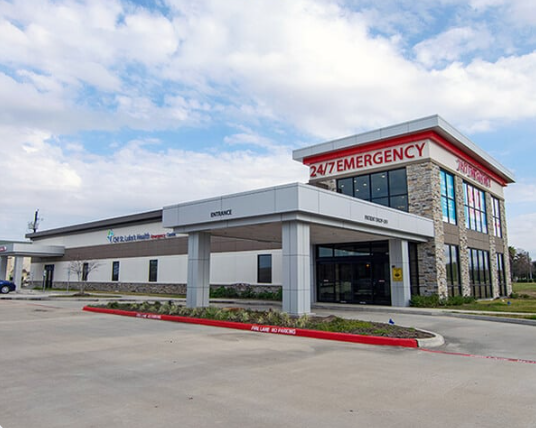Life is unpredictable. One minute you're fine, the next you might be facing an unexpected illness or injury. When an emergency strikes, knowing where to go for care can make all the difference. St. Luke's Health offers expert 24/7 emergency care through both our hospital Emergency Rooms and our Freestanding Emergency Centers – but how do you know which one is right for your situation?
It all comes down to the nature and severity of your condition. Choosing the appropriate facility not only ensures you get the right level of care promptly but can also save you time and reduce your out-of-pocket costs.
Understanding the Difference: Freestanding vs. Hospital ER
Both types of facilities are equipped to handle emergencies, but they serve different primary functions:
1. Hospital Emergency Rooms (ERs): These are full-service emergency departments located within a hospital campus. They are designed for the most critical, life-threatening conditions and provide immediate access to a wide range of specialized services, including:
- Advanced Diagnostics: Advanced lab testing, CT scans, MRI.
- Specialty Consults: Immediate access to specialists like cardiologists, neurologists, surgeons, etc.
- Admissions & Surgery: Capability to admit patients directly to the hospital for ongoing care or perform emergency surgeries.
- Intensive Care Units (ICUs): For critical patients requiring continuous monitoring and life support.
When to choose a Hospital ER: If you or a loved one are experiencing symptoms that could be life-threatening or require complex immediate care, a hospital ER is the safest choice. Such symptoms/conditions may include:
- Suspected heart attack or stroke symptoms (chest pain, numbness/weakness on one side, sudden severe headache)
- Trouble breathing or severe allergic reactions
- Deep wounds with heavy, uncontrolled bleeding
- Broken bones (especially open fractures or deformities)
- Severe burns
- Head injuries with loss of consciousness, confusion, or seizures
- High fever accompanied by uncontrolled nausea, vomiting, or dehydration
- Coughing up or throwing up blood, or blood in stool
- Suspected poisoning or drug/alcohol overdose
- Major trauma from accidents
2. Freestanding Emergency Centers (FECs): These are smaller, conveniently located emergency facilities that operate independently from a hospital, yet are often affiliated with a hospital system like St. Luke's Health. In fact, St. Luke’s Health offers three FECs throughout Greater Houston in Huntsville, Pasadena, and Holcombe. These facilities are designed for urgent, but not immediately life-threatening, emergency conditions and often offer:
- Shorter Wait Times: Due to typically less severe patient loads.
- Convenient Access: Often located closer to residential areas.
- Diagnostic Capabilities: On-site X-rays, basic lab testing, and CT scans.
- Transfer Capabilities: For patients presenting with conditions that require the services of a hospital ER, FECs can stabilize and arrange for rapid transfer.
When to choose a Freestanding Emergency Center: Choose an FEC for conditions that require immediate attention but are not life-threatening. These facilities could be a good option for:
- Care for minor injuries and illnesses
- Colds, flu, earaches, sore throats, persistent fevers
- Sprains, strains, simple bone and joint injuries, often requiring X-rays
- Cuts and scrapes that may need stitches
- Bug bites, stings, poison ivy, hives, or rashes
- Urinary Tract Infections (UTIs) and sexually transmitted infections (STIs)
- Minor allergic reactions (without breathing difficulties)
The Smart Choice for Your Health
Regardless of which facility you choose, rest assured that all St. Luke's Health emergency locations are staffed by board-certified emergency physicians and highly skilled nurses, providing expert 24/7 care for adults and children. We are committed to ensuring you receive the right care, at the right place, at the right time.
Medicare, Medicaid, and most insurance are accepted at all our emergency locations.
Find Your Nearest Emergency Location
No matter the emergency, St. Luke's Health is Here When You Need Us.
Don't wait when it comes to your health. Locate the emergency care that's right for you.
St. Luke’s Health Freestanding Emergency Centers
● Baylor St. Luke’s Medical Center Emergency Room at Holcombe Blvd. and Annapolis st.
● Huntsville Emergency Center at I-45 and Lake Road
● Pasadena Emergency Center at Sam Houston Pkwy and Preston Avenue
